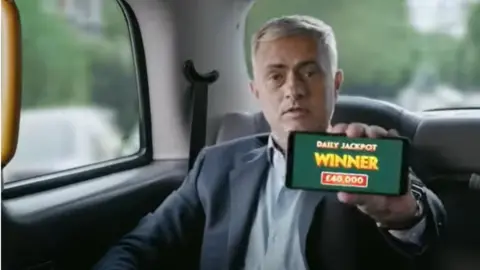New rules on gambling adverts ban celebrities and sports stars
 PaddyPower
PaddyPowerFootballers, celebrities and social media influencers will be banned from gambling adverts under new rules.
From October, gambling companies will not be allowed to use stars to target under-18s, The Committee for Advertising Practice said.
Anyone with a "strong appeal" for young people, such as footballer Cristiano Ronaldo and Love Island star Chris Hughes, must not appear in the adverts.
The body representing betting firms said it welcomed the new rules.
Michael Dugher, chief executive of the Betting and Gaming Council (BGC) said the changes built on industry-led measures designed to "drive up standards and ensure further protections in advertising."
The Committee for Advertising Practice (CAP) said the "tough" new rules were part of its commitment to safeguarding young people and vulnerable audiences.
The new rules state that gambling and lottery ads must not "be likely to be of strong appeal to children or young persons, especially by reflecting or being associated with youth culture."
References to video game content and gameplay popular with under-18s are also against the new rules.
There is opposition to gambling advertising amongst some politicians, parents and groups that campaign for awareness around gambling addiction.
Former England and Arsenal footballer Paul Merson, who became addicted to gambling himself, last month told BBC Sport it "sickens" him to see former players and managers in gambling adverts.
Earlier this year, Paddy Power launched a tongue-in-cheek ad featuring former Arsenal and West Ham player Jack Wilshere.
Former Tottenham Hotspur manager and I'm a Celebrity winner Harry Redknapp has previously appeared in ads for Betvictor.
And former Love Island contestant Chris Hughes is a brand ambassador for Coral Racing.
Shahriar Coupal, director of CAP, said: "By ending these practices, our new rules invite a new era for gambling ads, more particular to the adult audience they can target and more befitting of the age-restricted product they're promoting."
Lord Don Foster, chairman of Peers for Gambling Reform welcomed the CAP's step but warned it would not block all advertising reaching young audiences.
"It won't stop gambling advertisements appearing on the shirts of children's sporting heroes nor many of the other concerning actions of gambling companies who spend over £1.5bn a year promoting their products," he said.
"The government should ban all links between sport and gambling, all inducements, such as so-called "free" bets, and direct marketing to individual customers and take steps to reduce all forms of gambling advertising," said Lord Foster.
The industry body, the BGC said previously introduced measures were already helping to tackle the problem. A "whistle-to-whistle" ban on TV commercials during live sport before the 9pm watershed introduced in 2019 had reduced the ads seen by young people at that time by 97%, Mr Dugher said.
"Our members also introduced new age gating rules on advertising on social platforms, restricting the ads to those aged 25 and over for most sites," he added.
Playing cards, scratchcards, fruit machines and betting between friends were more popular platforms among young people for gambling than BGC member firms, Mr Dugher said
"The BGC take a zero tolerance approach to gambling by those under the age of 18 and we enforce the toughest possible action," he said.
The Conservative's 2019 election manifesto promised to overhaul gambling laws, following growing concerns over gambling's impact, especially on the young. After a series of delays a white paper, outlining new regulations, is now expected in May.
